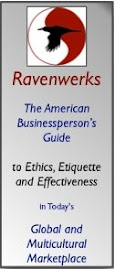Friday, July 25, 2008
To "Go Native" Or Not
Is more patriotic to dress like an American when you're abroad?
My thoughts-
If your objective is to be observed (if you're giving a lecture, attending an "official" function, representing your company or your country or whatever,) then, by all means, you should "dress like an American." John often a business suit with cowboy boots. He doesn't quite go so far as to break out the Stetson hat, mostly because it's a it large to travel with. :-)
If your objective is to observe, (as a tourist, a family friend, a businessperson there to meet with peers or negotiate a deal as an equal, etc.) then you should "do what the Romans do" and wear clothes that fit with local styles and customs as much as possible.
Two tales of misplaced fear
Rinku Sood, a retail specialist, related a story about how she set off alarm bells in an airport in China with a bag she was carrying for her boss, Mr. Sharma. Raising the level of anxiety, Rinku was traveling with a pregnant colleague who was suffering from stomach distress.
Apparently Mr. Sharma is a vegetarian and he carries food and utensils with him when he travels, and the bag he had asked Rinku to carry happened to have a knife in it.
Between recent terrorist activities and difficulties with the language barrier, our friend Rinku could have ended up in a Chinese prison - she said she was having unpleasant scenes from old movies running through her head while the police were called.
Eventually, cooler heads prevailed, the situation was explained and Rinku was able to catch her flight with her sick friend.
The other story also involves a knife - in this case, a teenager at a high school had helped a friend move over the weekend, and in the untidy mess of kitchen stuff a knife had fallen to the floor of the car, and remained there unnoticed, until . . .
The boy drove his car to school as usual on Monday and parked it in the school parking lot. Later that day, a security guard at the school was walking around the parking lot and happened to see the shiny knife sitting on the floor of the car. (Recently publicized events of violence in schools apparently came to his mind.) Since the school had a no-tolerance policy for weapons, the boy was EXPELLED from SCHOOL while an investigation ensued.
School officials interviewed the kid's friends, parents and teachers to ensure that he wasn't depressed, suicidal or crazy, and eventually he was allowed to return to school.
The point (bad pun) of both of these stories? We live in a society where most fear is misplaced and causes much ado about nothing. If we live among other people, we have to live with the fact that they have the potential to do us harm, with or without a knife. We just need to recognize that the probability of that that potential usually amounts to nothing.
We can't eliminate all risk, just be rational about it. The probability of staying home and dying from heart disease (due to stress, overwork and inactivity) is much greater than the probability of death or injury from anything that could happen while traveling internationally.
But for some reason, our fears are all in the wrong place.
Thursday, July 3, 2008
How I Made My First $100 Online
Years ago, as my husband and I studied for our advanced degrees (his in International Business, mine in Adult Education and Distance Learning) we wrote a lot.
We wrote papers, dissertations, theses and essays. We did a lot of research and interviews. Just by virtue of the amount of writing we were doing, and the quality of people we were interviewing and researching, some of the materials we wrote turned out to be pretty darned good. They were too good to just file away and never be seen again. In a lot of cases, we could see that people might be able to save themselves a lot of time and hassle if they had this information handed to them in a neat format, rather than learning things the hard way, as we did.
We were also experimenting with web technology at the time, so we built a very simple website that organized our articles into topic
- Global business
- Leadership
- Teamwork
- Marketing
- Etiquette and Communications
- Customer Service
- Technology
- Finance
- Small Business and
- Aviation & Travel
It may sound like a strange collection of topics, but we’ve found that many people who are interested in one of these topics is often interested in another.
Thus, Ravenwerks was born.
We had no idea how to “monetize” the site, and our first objective was simply to monitor traffic for fun. We had little informal competitions about whose articles were more popular. (My article on etiquette usually edge out John’s on International Business and Finance, which is a constant source of glee for me.) We did some search engine optimization and experimentation with meta tags to see what would happen. We were doing great, and getting lots of traffic, and said to each other many times in the ensuing months that we should DO SOMETHING with all this traffic. We’d heard about many people making money on the Internet. While I was between jobs, we experimented with affiliate programs and with EBay. We made almost nothing with the affiliate programs. We made some money selling the stuff out of our basement, but we quickly qualified our demands of our “dream retirement job” as something that would not involve inventory, shipping or returns.
The breakthrough came when I was using Google’s search engine optimization tools, and happened upon the Adsense program. I was skeptical because of our experiences with the affiliate programs, but I put the code on one of our page, anyway.
The Adsense program involves a set of tools that allows you to customize an advertising space on your website. Using simple tools, you designate the size, colors, whether you want display or text ads. The weird par t is that you have no idea what ads will actually show up on your web pages. You are handing control of that small space, within the parameters you specify, to Google.
By some bizarre magic, Adsense evaluates your web site and places ads that are relevant based on your web site content. I have no idea how it works, and frankly, sometimes a rather weird match shows up. Occasionally you’ll get something regarding power tools on an etiquette article. But for the most part, the ads that show up are relevant.
Another nice feature of Adsense is that they have a monitoring page where you can log in and see, real time, how much money you’ve made that day, week, or month. You can run custom reports, export to Excel, and so forth. We became addicted to watching the reports.
We immediately made over $10 in one day! I was thrilled.
Our site was built with Dreamweaver templates, so it was fairly simple to add the Adsense code on all of the pages in our site. In our first month, we’d easily made $100. We’ve made as little as 9 cents per day, and as much as $18.37; but we can pretty much count on it for $100 -$200 per month. This is not much, certainly not enough to quit one’s day job, but it’s almost entirely passive income from articles and papers that would otherwise be lying around useless. We occasionally contribute a new article or blog to keep the site fresh, and we’ve met a lot of very nice people who write to us for advice on various matters.
In watching the traffic, I’ve discovered niches that lead to other business ideas. As an example, I’ve found that etiquette and international business travel for women makes a nice intersection that is absolutely fascinating. People have questions – should a woman pack a business suit with a skirt or with pants (or a burqua, for that matter!) for a business trip to Oman? More and more women are traveling to the Middle and Far East on business. I’ve started interviewing women (and men) who are frequent business travelers to these areas and am writing a book, organized by city. I’ve started a new web site (connected to the old one) to monitor and generate interest.
Making money online, at least for us, has not been quick or easy. Like any other business, you get rewarded for providing real value to real people. The internet just makes that simpler and easier.




